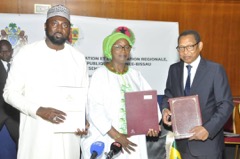
[ad_1]

The meeting responded to the aspirations and vision of the three Heads of State and Foreign Ministers, providing them with an opportunity to reflect, discuss and put forward recommendations to address the urgent demands and challenges of the people in order to change and improve their lives.
At the end of the meeting, Gambian Minister of Foreign Affairs, International Cooperation and Diaspora, Momodou Tangara, expressed his appreciation and gratitude to the Government and brotherly people of Senegal for the consistent and warm hospitality they have extended to them since their arrival in the beautiful city of Dakar.
He highly commended the appropriate logistical arrangements made for the successful holding of the first meeting of the Ministers for Foreign Affairs of Guinea-Bissau, Senegal and the Gambia on subregional cooperation and integration.
“As we draw to a close of this first tripartite meeting, I would like to take this opportunity to express my gratitude and appreciation to my sister, His Excellency Yacine Fall, and my brother, His Excellency Carlos Pinto Pereira, for their shared will and efforts that led to this great initiative that will contribute to the realization of the vision of our leaders and the aspirations and aspirations of the people of our sub-region,” he said.
He went on to say that the meeting was a response to the aspirations and vision of the three Presidents to accelerate and expand sub-regional cooperation and integration, and provided an opportunity to reflect, discuss and make recommendations “on the urgent need for us to act together to address the pressing demands and challenges of our peoples to transform and improve their lives”.
He further stated: “So, as we work to implement the outcomes of this Trilateral Ministerial Meeting, I also take this opportunity to thank the experts and representatives of the three countries for their tremendous efforts and the high quality of their work. Excellencies, ladies and gentlemen, The Gambia, Senegal and Guinea-Bissau have a lot in common. Even after the Balkanization of Africa and the establishment of colonial borders, our peoples have always felt that they are one people, speaking the same language, sharing the same culture and religion, intermarrying, and sharing the same aspirations and destiny.”
This is further evidenced by the fact that there is hardly a citizen of Guinea-Bissau, Senegal and Gambia who does not have relatives or close friends on the border, he added.
“It’s mainly the same people moving back and forth between the three countries in search of a better life,” he said. “However, even travelling within the sub-region is sometimes a nightmare and, more importantly, the trade figures between us leave a lot to be desired.”
Minister Tangara noted that the region is endowed with abundant fertile arable land, rich other natural resources, a young demographic structure, similar conditions in all aspects, a large population size, and increased cooperation and integration among countries, which can only bring the desired stability, peace and prosperity to the sub-region.
“If our sub-region cannot serve as a model for greater integration and cooperation within ECOWAS, then we can hardly expect Africa to achieve the integration and development we want. In this context, we must always remember and pay tribute to the founding fathers who fought for our freedom and had a vision and aspiration to bring development, cooperation and integration to the ECOWAS sub-region and Africa as a whole. Our three leaders hope to realize the same vision and mission for the benefit of our peoples,” he advised.
Therefore, our collective commitment and solidarity will inspire our people and rekindle their hope in working towards meeting common challenges.
He expressed optimism that the outcome of the tripartite talks would help accelerate socio-economic, cultural and political integration in the sub-region and promote greater peace, security, poverty reduction and overall development.
“Today, we all know that our sub-region is not without challenges that require our concerted efforts to address and work towards planning a future that fully meets the needs and aspirations of our people, especially women and young people in the sub-region,” he said, adding: “Our sub-region continues to face challenges related to transnational crime, youth unemployment, irregular migration, climate change, the need for industrialization, lack of market access, etc.”
[ad_2]
Source link

